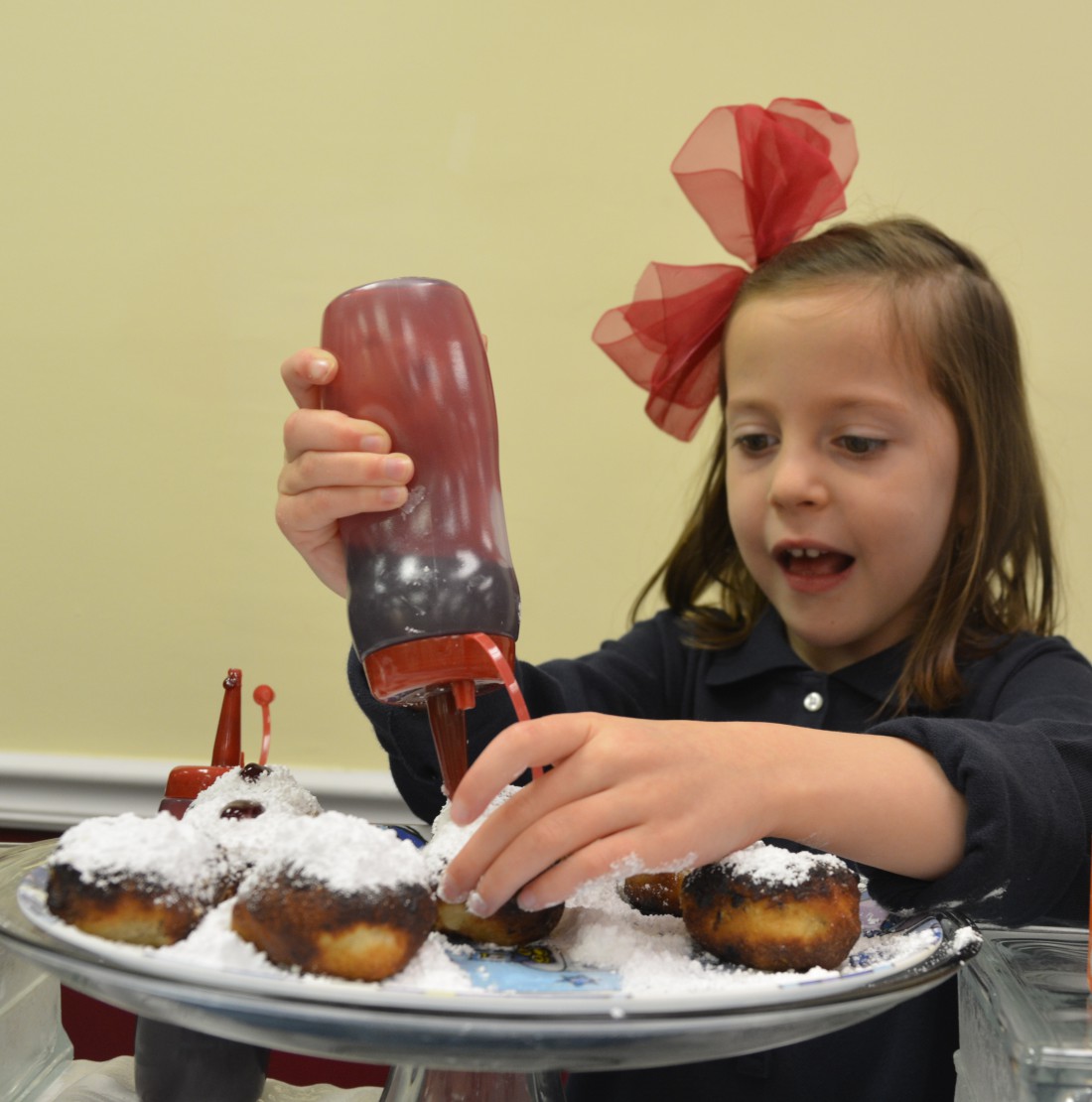Hanukkah is all about the oil. The miracle of one day’s worth of oil lighting the Temple in Jerusalem for eight days is only the beginning as Asheville’s Jewish families cook traditional foods for the eight-day celebration of lights.
The two most common foods are potato pancakes known as latkes in Yiddish and jelly doughnuts called sufganiyot. These foods “are meant to remind us of the oil used in the lamp at the rededication of the Temple in Jerusalem,” says Lauren Rosenfeld, education director at Temple Beth Ha Tephila in Asheville. “In fact, Hanukkah means rededication.”
Oil also represents resilience in Jewish tradition, says Rabbi Shaya Susskind of Chabad House. “Some of the greatest light comes after challenge.”
The Temple in Jerusalem was deliberately defiled by Syrian-Greek conquerors, but it was reclaimed and rededicated by the Maccabees in 165 B.C. As the temple was rededicated, the lamp contained enough oil for just one day, and more oil was eight days away, yet the lamp stayed lit until more oil arrived.
“No matter how dark things may seem, we can still reclaim the sacred in our lives, for our children and in memory of our ancestors,” Rosenfeld says.
Hanukkah traditions always include children, says Susskind, who has four daughters and another baby due any day. The dreidel, a top spun by children, is designed to help them learn their faith and culture and stems from the time when the Syrian-Greeks banned the teaching of the Torah. The Hebrew letters on the sides of the top say “A great miracle happened there” (dreidels made in Israel say, “A great miracle happened here”), and encourage children to learn Hebrew and to study the scriptures.
In Jewish tradition, gelt, or money is offered each day of Hanukkah as a gift. One reason, Susskind says, was to make sure poor people could afford the candles needed to observe the holiday. Susskind and his wife, Chana, give their children $1 on the first day, $2 on the second day, and so on — $36 in total.
But the primary culinary tradition for Hanukkah is fried food so that Jews can remember and celebrate the miracle of rededication.
“Another thing about oil is that it gets all over the place but never loses its identity,” Susskind says, which is symbolic of the Jewish diaspora and the miracle of Jews being able to maintain their cultural and religious identity for centuries, even without a homeland.
Susskind’s daughters, twins Mushka and Pessel, who will turn 8 in January, Devorah, 6, and Sarah’le, 4, already know why they eat latkes and sufganiyot this time of year, and they enjoy sharing what they’ve made with their community. “I like to bring them to old-age homes and to light the menorah there,” Pessel says.
The food traditions vary slightly from place to place, says Rabbi Justin Goldstein of Temple Beth Israel in Asheville.
“Since Hanukkah is heavily inspired by the story of the miracle of a small cruse of oil without enough for even one day burning for eight days, it has become the custom to consume oil, largely through fried foods,” he says.
In Eastern Europe, this was latkes. In North Africa, it’s a deep fried sponge cake called sfenj, which inspired the doughnutlike sufganiya that are eaten in Israel. The sufganiya in Israel, where global Jewish culture blends, is a mix of the sfenj and the German Hanukkah treat known as ponchkes, which is two pieces of fluffy dough wrapped around jam or custard and deep-fried.
Sephardic Jews (from Spain and Portugal) eat bimuelos, a Jewish version of the traditional Spanish dessert buñuelos. While buñuelos have no connection to winter, many descendants of Sephardic Jews whose families had converted to Christianity centuries ago still eat the fried dough balls around Christmastime.
For the past several years, Chabad House has offered a public event called Chanukah Live! to observe the holiday. But because the first day of Hanukkah falls on Christmas Eve this year, the 2016 event will be a little different. Called Drinks and Dreidels, the evening celebration will feature a menorah lighting, a Chinese food buffet, latkes and sufganiyot, music, dancing and games.
“We’ll have Chanukah Live! again next year,” Susskind says. “I know our non-Jewish friends will want to know that because a lot of them join us for the celebration.”






Before you comment
The comments section is here to provide a platform for civil dialogue on the issues we face together as a local community. Xpress is committed to offering this platform for all voices, but when the tone of the discussion gets nasty or strays off topic, we believe many people choose not to participate. Xpress editors are determined to moderate comments to ensure a constructive interchange is maintained. All comments judged not to be in keeping with the spirit of civil discourse will be removed and repeat violators will be banned. See here for our terms of service. Thank you for being part of this effort to promote respectful discussion.